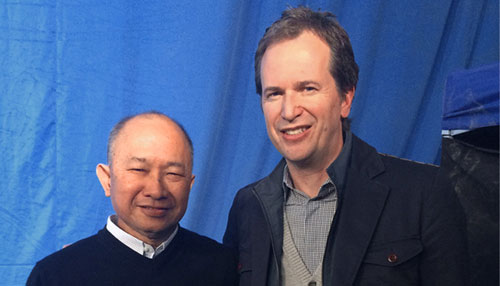Entertainment
Anthony Vogels: IMAX’s Ambitions in China’s Film Industry
By Daisy Lin

Anthony Vogels is the senior vice president of international film development at IMAX Corp., the large-format film company that presents blockbuster films on giant screens. Vogels, formerly a longtime executive at film distributor United International Pictures, now leads IMAX’s efforts to select local-language films for presentation in the IMAX format – a key growth strategy for IMAX, which now has a presence in 66 countries and in more than 1,000 theaters globally.
What is IMAX’s reach in China?
We have more than 260 screens at the moment, with approximately another 200 in backlog. Eventually our number of screens in China will overtake our total in North America, where we have about 475 screens. China is the second-biggest and fastest-growing market in the world for us. Using our proprietary software, IMAX DMR®, we digitally re-master Chinese films for presentation in our theaters in China. As a result, when there is a blackout period for foreign films in China, we're able to switch gears and move from Hollywood titles and screen a Chinese local-language film. In 2015, we released 31 films in China. This film slate was a more eclectic lineup of titles than our U.S. film slate because we have both Chinese and Hollywood content.
Tell us more about the film fund that IMAX set up to fund Chinese-language films.
We established a $50 million film fund with China Media Capital. We anticipate spending approximately $4 million to $7 million on each Mandarin local-language production that we feel would be suitable for the IMAX format and something IMAX fans in China would want to see. Our goal with the fund is to invest in the film during its embryonic stage and eventually release it in IMAX.
We would also like to release these Chinese films in the U.S. market. We recently did this with “Wolf Totem,” which we presented on approximately 100 IMAX screens in the U.S. This demonstrates our commitment to the Chinese film industry and our hope is to export more Chinese movies to the U.S. market, as long as they fit the scale and scope of the IMAX format.
What kind of films is IMAX looking to get involved with?
The films we select are action-adventure films that are epic in nature with stories and visuals that are vast in their scope and scale. IMAX films demand to be seen on the biggest screen possible with the latest audio and projection technology in order to immerse moviegoers into the story and give them a “feel-like-you-are-there” experience. So we would not get involved with a drama that, for example, takes place in a nightclub, where there aren't any large-scale scenes.
The upcoming U.S.-China co-production “The Great Wall” is a great example of the type of film that would be suitable for the IMAX format. We believe it has a chance to cross over into the U.S. and other Western markets and become quite successful. The film is a powerful action adventure that is a visual epic, and it stars A-list American and Chinese actors Matt Damon and Andy Lau. It has all the ingredients to be a success outside of the Asia-Pacific area and become mainstream. I believe this could be a real test for the Chinese film market and it will be interesting to see how it evolves.
How does IMAX work with filmmakers?
IMAX has worked hard over the years to build strong relationships with today’s leading filmmakers. We’ve established a trust that sets us apart and has allowed us to become a part of the creative process, so filmmakers are designing their movies with IMAX in mind.

"The goal is to work together to enhance the audience’s experience."
We're often involved with films at the script or production stage. We obviously never dictate to filmmakers how they should make their films, but we are there to help bring their creative vision to life in IMAX. So they'll often want to know how to use IMAX cameras, for example, if they want to do particular long shots, and also how the film will look in IMAX when it’s eventually re-mastered using our proprietary enhancement process, IMAX DMR®.
The content being shown in an IMAX theater is significantly better than the content playing down the hall because of IMAX DMR®. The film hasn’t just been enlarged to fit the IMAX screen; it’s been completely transformed. IMAX spends hours, weeks and months on location and in the editing room with the director and technical teams of each film planning the shots, remixing the sound, endlessly adjusting the saturation, contrast, brightness and hundreds of details in virtually every frame with IMAX DMR®. No other company in our space can make this claim.
We are fortunate that we have tremendous brand awareness in China. Audiences have grown up on IMAX and know that if a Chinese movie is in the IMAX format, it's usually something pretty special and worth seeing.
Is there anything you've learned from working in China? Is there any advice you would give?
I've lived in Southeast Asia for a long time, and my son was born in Thailand, so I'm very attuned to cross-cultural differences. I feel that being successful in Asia is about listening, understanding and never being arrogant in your opinion about how things need to be done. It's more about a relationship of mutual respect and collaboration. The goal is to work together to enhance the audience’s experience.
We've had a number of extended discussions with film director Zhang Yimou, the director of “The Great Wall,” and we've had technicians come in, show him our cameras and discuss how they can be used in his film. This is the way we engage with multiple filmmakers, including director Lu Chuan. All of the filmmakers we work with want to present their films in the best possible way and when they know their film is going to be in the IMAX format, they're pretty excited about it.
Subscribe to the Reach Further Newsletter
Get inspiring stories in your inbox every month.

